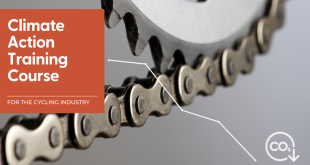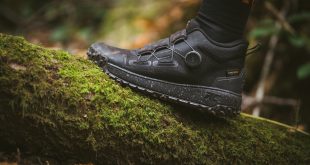Schwalbe is one of the manufacturers leading the way in regards to tackling its own ecological impact head on in the cycling industry. Daniel Blackham speaks to Felix Jahn, the brand’s CSR manager
This piece first appeared in the September edition of BikeBiz magazine – get your free subscription here
For Felix Jahn, his relationship with Schwalbe is different to that of a traditional employee.
As the grandson of company founder Ralf Bohle and nephew of current managing director Frank Bohle, the German tyre brand has played a big part in his life.
“You could say that,” said Jahn.
“We are a very bicycle centric family.
“It’s a little bit of a cliche where as a child at work, I would ride around with my balance bike in the warehouse, it was significantly smaller back then. So it’s quite nice to have seen this type of development and to grow up with the Schwalbe family
“I’ve known a lot of these people for all my life, but they’ve been working for 30 years now. We’re at a stage now where their children are even in Schwalbe. So you have second generation employees. It was just incredible. Yeah. And we are very proud of the fact that we are a family owned business.”

Responsibilities
With Jahn having known the company and many of its employees for all his life, he sees his position within the corporate social responsibility (CSR) team as fundamental to everything Schwalbe is trying to achieve.
“[CSR is] a buzzword these days but it really has always been with us since the very beginning,” said Jahn
“On the social side we do a lot of social engagement, social action and justice – like so many family owned businesses do.
“And then of course we have huge leverage to implement environmental responsibility through our products and through our operations.
“We are in luck that we are positioned within the cycling industry and the bicycle promotes health, emission free mobility and less congestion.”
Within his role as CSR manager, Jahn sees it as Schwalbe’s duty to make the bicycle itself as sustainable as possible.
This is why the brand has invested in the CSR department to grow it to five people.
“We are a total of five people covering huge topics,” said Jahn
“A little bit broader perhaps than a traditional sustainability management department. We do chemical assessment, material health, but also mobility, employee wellbeing, product sustainability, supply chain transparency, compliance and human rights issues and so forth.
“So there’s a lot to do, and we’ve already accomplished many things, but we’re still not at the end, if anything, we’re still at the very beginning. And that’s an exciting journey.”

Genuine concern
Sustainability and the noise around it may be perceived by some as a PR exercise for international brands and corporations.
‘How do you know what a brand is really doing?’ is a valid question.
With Schwalbe, they tell you.
In October last year, the brand published its first CSR report. A 99-page document that provides transparency on its ecological impact, as well as laying out short and long term goals.
“We wanted to publish the best possible CSR report,” said Jahn
“I think creating transparency is incredibly important, especially in our industry.
“We have a complex global supply chain, and we need to be more transparent to the consumers and the dealers so that they know: what these products are made of, where they are made, who’s behind this, what does it take to make these products, what’s the damage to the environment.”
Schwalbe decided to base the report on the Sustainability Reporting Standards of the Global Reporting Initiative (GRI Standards).
This is an internationally recognised guideline that enables standardisation and comparability of all sustainability topics between different companies, even outside the bicycle industry.
“You could essentially take this report and compare it with the sustainability report of a washing machine manufacturer,” said Jahn
“That’s what this standard allows, a level of comparability, transparency and putting yourself out there.
“You feel a little bit vulnerable but it’s important that people know that you make yourself accountable for the things that you do.”

Milestones
With Schwalbe established in 1973, Jahn says that sustainability in various guises has been at the core of the brand since the beginning.
However throughout the journey, there are specific milestones that can be used as touch points.
“One was in 1983, when we launched our first Marathon,” he explained.
“It was really the first tyre developed for the cyclist, developed for really good puncture protection, for long durability, for everyday use at a reasonable price point.
“Back then we didn’t think about it being a sustainable product but it kick started our product development into being aware of making products that will last, making good products, making quality products and that still continues to this day.”
The second milestone that Jahn refers to could be seen as the starting point for Schwalbe’s tangible attempts to tackle sustainability in the product cycle of tyres.
In the early 90s, the brand started taking back tyres through its dealers in Germany and made rubber floor mats out of them for workshops
“That was our idea of recycling back in the 90s,” explained Jahn
“Nowadays we know much more. Back then it was downcycling, which is only a continuation of the linear economy and as an industry, as a society, we must get away from constantly using new resources and throwing them away.
“At the end of the day, old tyres, old tubes, they’re still valuable raw materials. We can reuse it if we do it properly.”
The first step of taking back old tyres and tubes led Schwalbe to consider what else could be done.
Fast forward to June 2023 and technology has enabled them to celebrate another significant milestone, the launch of the Green Marathon.
The Green Marathon is made from 100% fairly traded natural rubber and consists of 70% recycled and renewable materials.
But launching it at Eurobike marked the end of a long road.
“It took us essentially 20 years,” said Jahn. “I would say the first 15 years consisted of us talking to potential partners and everybody laughing in our face saying ‘it’s not possible’.
“The biggest hurdle at the very beginning was shredding the tyre without destroying the machinery, which we eventually did [overcome].
“And then it’s relatively easy to reuse recycled materials in a new product, but there’s no benefit to the cyclist or to the environment if that product only lasted half as long.
“You must find that balance of using recycled and renewable materials and maintaining the same quality and performance. I think that’s the only way you can also win over people, customers, and stakeholders. And that is something that we now achieved with our new Green Marathon tyre.”

The future
Although Jahn and his CSR team are making strides in terms of reducing environmental impact, there is still a long way to go.
Currently, the tyre recycling can only be processed in Germany with many other countries only offering a tube collection service.
Jahn would like to see this change in the future and it’s something Schwalbe is working to achieve.
“That is the question I get on a daily basis [on expanding beyond Germany] and I totally get it,” said Jahn
“You have over 30 million tons of old tyres a year globally – only a very small fraction of that is bicycle tires – but almost half of those tyres are burned. The other half usually ends up in landfill, so there’s a lot to be done.
“But there’s a huge logistics machinery behind this system. It’s a lot of organisation and there’s also legal hurdles you need to overcome when you transport tyres from one border over the other.
“So yes, we are working really, really hard on rolling this out.
“We will get there, but right now it’s only in Germany.”
On the future of Schwalbe products, Jahn sees the Green Marathon being the starting point for future development of the brand’s other products, just like the original Marathon was in 1983.
“It [the Green Marathon] sets the benchmark, and every new product whether it’s a road tyre, or a high end downhill mountain bike tyre is measured against that sort of benchmark,” said Jahn.
“We will see these green attributes of the Marathon in more and more Schwalbe tyres in one way, shape or form.
“Our R&D is not done either. We are highly motivated and we have amazing suppliers that are always coming up with new materials which can be tested and tweaked.
“I’m really confident for the future that we see a higher content of recycled and renewable materials in all products, meaning that in general across the board our product will be environmentally responsible. That, mixed in with recycling in more markets, I think will make a great impact for cyclists, as well as the dealers.”
 BikeBiz Bicycle and cycling retail news
BikeBiz Bicycle and cycling retail news




